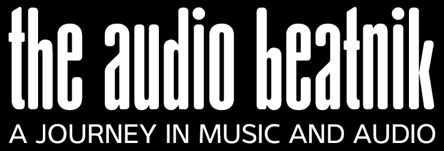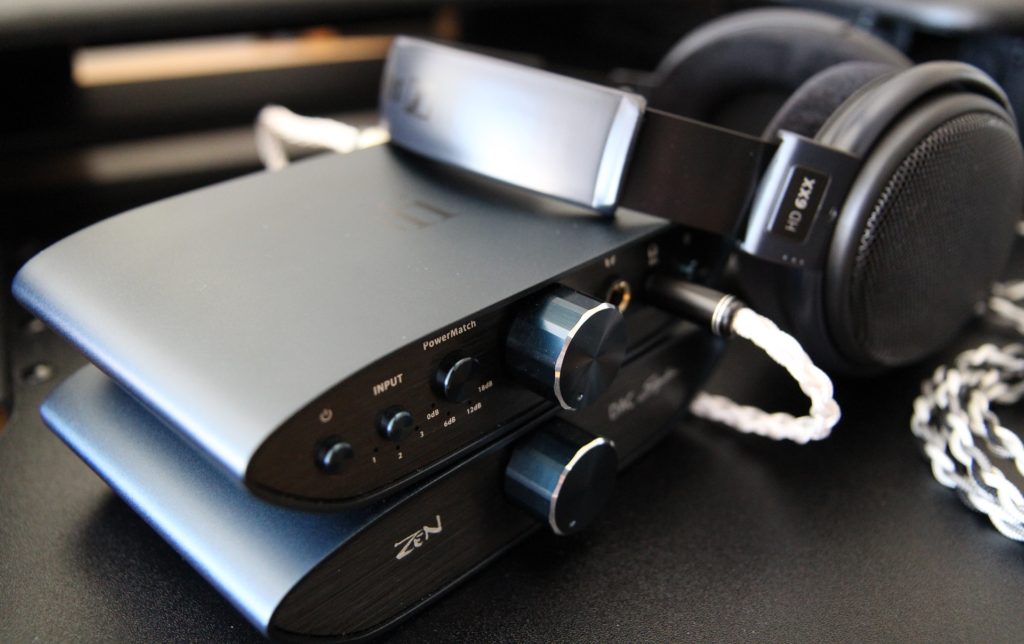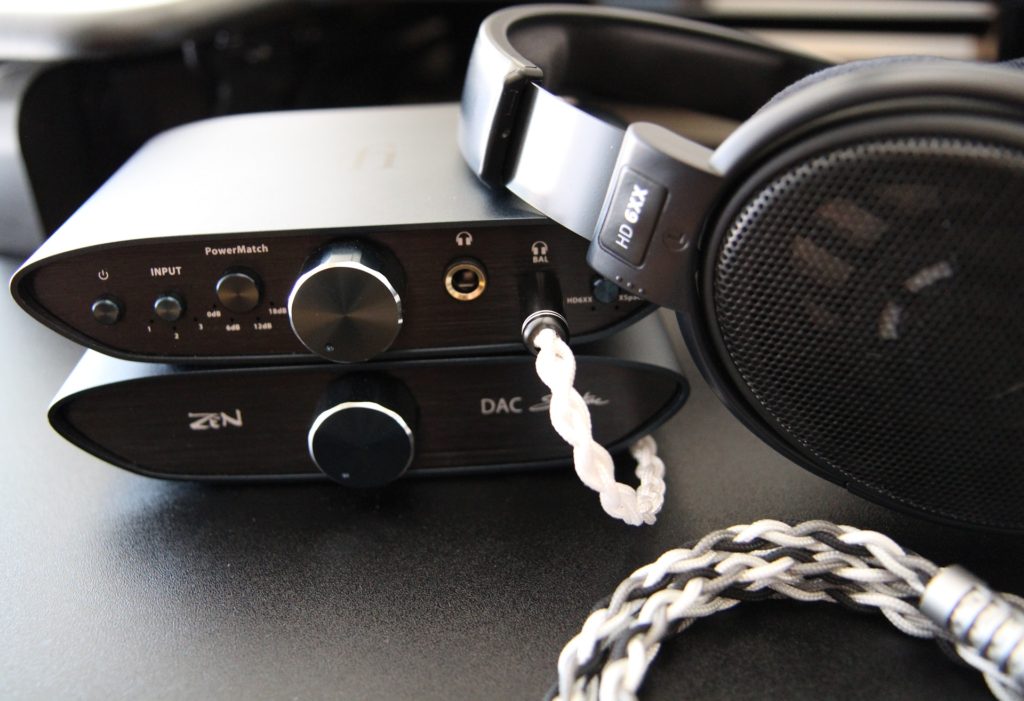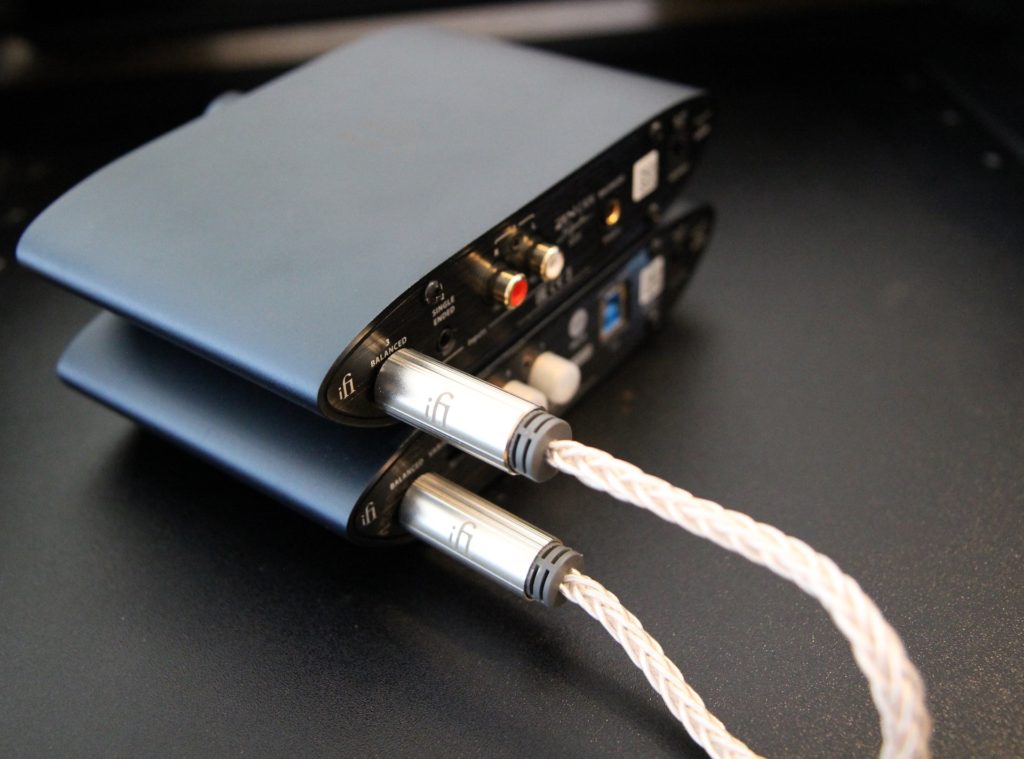Do you own the Massdrop x Sennheiser HD 6XX headphones? If so, you need to hear them with the iFi ZEN Signature Set ($599) from iFi Audio. I’d usually wait until the conclusion to make a big statement like that, but I started with it in case you only read one sentence of this review.
The iFi ZEN Signature Set consists of the ZEN CAN Signature 6XX and ZEN DAC Signature, bundled along with a 4.4mm Pentaconn balanced cable to connect them, and two iFi iPower X power supplies. The value included with the bundle is worth mentioning. The ZEN CAN Signature 6XX normally retails for $299, and the ZEN DAC Signature for $299. The 4.4mm interconnect sells for $69, and the iPower X retail for $109 each. So, you’re saving a total of $286 with the set versus buying everything separately.
Design and Features
Most notably, from input to output, both the ZEN DAC Signature and the ZEN CAN Signature 6XX are fully balanced symmetrical dual-mono designs. That might not sound like much, but this is typically unheard of at these prices. They also both have above-average flexibility in terms of inputs and outputs. The DAC has both RCA and 4.4mm balanced outputs. The CAN has three different inputs: 3.5mm, RCA, and 4.4mm balanced. The CAN also has a 4.4mm balanced pre-out, for connecting to a power amplifier or a pair of powered monitors. On the front panel it has both a 4.4mm balanced headphone output as well as the standard quarter-inch jack.
Alongside the smooth but touchy volume knob on the CAN, there are also four gain settings, and the button to enable the HD6XX custom EQ or the XSpace features. Instead of iFi’s standard and popular XBass setting found on the ZEN CAN, the Signature edition has the 6XX equalization curve (ActiveEQ). iFi specifically tailored the ActiveEQ for the Massdrop x Sennheiser HD 6XX headphones. iFi recognized the immense popularity of these headphones which have sold over 130k pairs to date. They decided to develop an all-analog EQ tuning circuit to maximize the performance of these already impressive-sounding headphones.
Sound Quality and Synergistic Performance
I approached this review by first listening to the standard ZEN CAN headphone amplifier. I wanted to get a baseline understanding of its performance and sound character before I tried the polished and upgraded Signature edition. Then I listened to the ZEN DAC Signature on its own, connected to my SPL Phonitor X amp. In both cases, I wasn’t immediately enamored by the performance of either device on its own. However, once I connected the ZEN DAC Signature to the ZEN CAN Signature 6XX with the included 4.4mm cable, everything changed.
Almost immediately, the synergy that iFi has engineered into these two products was obvious. They are clearly designed to work alongside each other to provide their highest level of performance. I understand that iFi is selling these as a set, but I was still surprised at how pairing the two elevated the performance of each device versus using them independently.
The overall sound quality with the ZEN Signature Set was punchy, vivid, and up-front, a full-bodied and muscular sound. There weren’t any elements of the music that artificially stood out. It simply sounded like a powerful, bold, and clear presentation that put me directly in the front row of everything I listened to. This straightforward and genre-agnostic style sound quality ensured it sounded equally comfortable with anything I played. Standard-quality recordings sounded above average. Audiophile recordings scaled up accordingly, delivering a listening experience I wasn’t expecting at this price.
The HD6XX ActivEQ
The custom EQ curve that iFi developed to optimize the performance of the HD 6XX headphones corrects some deficiencies in the low-end frequency response. It’s also meant to bolster a certain range of the treble energy within the presence region, where most of the song’s high frequency information resides.
Different from the XBass setting on the standard ZEN CAN, the 6XX bass boost here feels more natural and affects the lower bass and sub-bass frequencies the most. Starting with 60hz and below, it adds a noticeable extension, and there’s more than enough power on tap so that the lows never sound sluggish or distorted. It’s not too much of a good thing; they nailed the implementation of the bass portion of the EQ. This is how the 6XX headphones should have come voiced from the factory.
The treble difference is perceptible, but it’s a subtle change that occurs mostly in the 6kHz area. There’s also a slight increase in the 15kHz area. It sounded as if more air and space were added to the overall treble presentation. I could also discern the slight increase in level at or around the 6kHz area on certain songs that had high hats or cymbals in this region. It mainly served to flesh out these frequencies and create a more open and balanced presentation. iFi clearly practiced restraint here, and it shows in the implementation.
After listening to the HD 6XX headphones through the Zen Signature Set with the HD6XX ActivEQ enabled, I can’t imagine listening to them any other way. It raises the performance of the headphones to another level.
Other DAC and Headphone Pairings
Despite the obvious improvement to the overall performance of the HD 6XX headphones, I explored the versatility of the ZEN Signature Set with other DACs and headphones. Many audiophiles own several pairs of headphones and also might want to upgrade to a new DAC in the future. You don’t necessarily need to have the HD 6XX headphones to enjoy the ZEN Signature Set. Let’s see how the ZEN CAN Signature 6XX sounds when used with other headphones and DACs.
Sennheiser HD600
This close cousin to the HD6XX features the same physical design, but noticeably different voicing. The HD6XX ActiveEQ improved their performance, but in a different way than the HD6XX. With the HD600s, the treble portion of the EQ added a distinct sensation of widening the soundstage. The bass compensation was similar, but they didn’t seem to dig as deep as the HD6XXs do. Overall, just like the HD6XXs, the HD600s benefitted substantially from the ActiveEQ.
Audeze LCD-3
Showing off its versatility, the ZEN CAN Signature 6XX scaled up flawlessly when I connected my LCD-3s. The HD6XX EQ potently extended their sub-bass performance. There was also a subtle, but noticeable fleshing out and highlighting of specific treble frequencies. These changes didn’t draw attention to themselves, but I could hear more shimmer and sparkle in the highs of certain songs. During “Monika & Akuratyde – Moment ft. Laura Hunter”, I got goosebumps during the song’s vocal breakdown because of how stunning and clear the vocals were. This inexpensive headphone amplifier scales up its performance perfectly with this high-end ultra-premium headphone! What a great combination. Who would have thought that pairing a $299 headphone amplifier with a $2,000 pair of headphones would sound so good?
RME ADI-2 FS
I put the transparency of the ZEN CAN Signature 6XX to the test when I connected my RME DAC, which features impeccable measured performance specifications. I was pleased to hear that the sound signature of the RME DAC came through unrestricted. The neutrality and transparency of the ZEN CAN Signature 6XX were more than enough to let the RME DAC strut its stuff. Just like when I first reviewed Benchmark’s equipment, I got the unmistakable sensation of feeling closer to the music.
Topping D30Pro
The ZEN CAN doesn’t limit your DAC’s performance. Instead, it allows you to find a DAC that works best for you and your listening tastes. It was easy to hear the unique performance of the D30Pro shining through, most notably its above-average bass performance and overall coherence of sound. Topping’s implementation of quad Cirrus Logic CS-43198 DACs is exceptional and makes everything you play through the D30Pro sound “just right.”
ZEN Signature Set Vs. Schiit Jotunheim 2
I normally avoid directly comparing the product I’m reviewing to a competitor. However, with how versatile and fully featured the ZEN Signature Set is I couldn’t find a competing product that had the exact same price and specs. The Schiit Jotunheim 2 was the closest competitor that ticked all the boxes.
The Schiit amp has an “audiophile” presentation and voicing when listening through the built-in AKM-4490 DAC into the HD6XX headphones. The sound is expansive and has more space, decay, and micro details/layering than the ZEN Signature Set. It’s a more nuanced approach versus the iFi’s big, bold sound. I did notice there was a slight hardening of the leading edge of the upper treble with the Jotunheim 2, especially when turning up the volume. I didn’t notice any treble hardness or harshness with the ZEN Signature Set, perhaps thanks to the iFi’s iPower X power-filtering features.
Unlike the ZEN CAN Signature 6XX, the Schiit amp had no channel imbalance issues with the volume knob at its lowest levels. It also has a dedicated switch for enabling or disabling the pre-outs. This is an outstanding convenience feature on the Jotunheim 2. Without it, you constantly need to power your studio monitors or external power amplifier on or off. The ZEN CAN Signature 6XX on the other hand always has its pre-out active, regardless of whether the headphones are connected or not. I found this irritating during daily use when switching between speakers and headphones.
Ultimately however, the Schiit Jotunheim 2 doesn’t have iFi’s unique HD6XX ActiveEQ, so the HD6XX headphones simply can’t perform up to their full potential. While the Schiit amp pairing does bring out other admirable elements of their performance, the iFi ZEN Signature Set does a better job overall at raising their performance to new heights.
Conclusion and Value
Despite a recent price increase from $499 to $599, the iFi ZEN Signature Set remains a remarkable value in terms of feature set and price to performance ratio. Like I wrote in the second sentence of this review, if you own a pair of the Massdrop x Sennheiser HD 6XX Headphones, you need to hear them on the ZEN Signature Set. There may be no better way to enjoy them.
Related 2021 Reviews from The Audio Beatnik:
- Review: iFi micro iDSD Signature by Drew Gagliano
- Review: ifi ZEN Phono Stage, Affordable Audio with Great Sound by Ken Redmond



